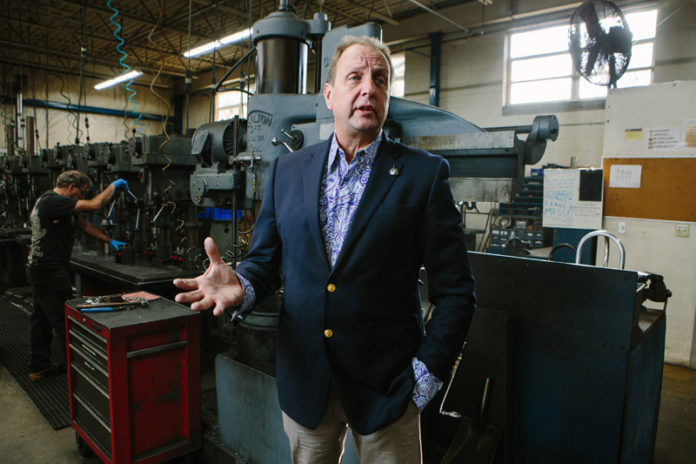
Karl Wadensten, president of Richmond-based VIBCO Vibrators, is a leader in lean processing. The concept isn’t about reducing employees or jobs, but about eliminating waste and unnecessary steps in everything from government license approval to manufacturing. Wadensten, who also serves on the R.I. Commerce Corp.’s board of directors, is among the business leaders offering guidance to Rhode Island in its effort to make state government processes more efficient.
You are a proponent of lean manufacturing. How does that work in practical ways?
Lean is a really simple concept, and it engages a lot of people to look at a process and remove waste. The one premise if you really want to think about this, is in hindsight, it’s really common sense.
Give us some examples.
A number of years ago, we got curious about our machining area. That’s where every single thing we make has to go through. It’s a critical piece. If we can’t get it through that area, we can’t deliver to our customers. We can’t collect money and grow. One of the things you do in lean is basic problem-solving. We started asking the five whys. “Why can’t we get all the pieces through the machine shop?” Well, we don’t have enough man hours. “Why don’t we have enough man hours?” Because, sometimes our attendance is off. “Why is our attendance off?” Well, the guys are hunting for their tools. Or they don’t know what to work on next. “Well, why don’t they know what to work on next?”
Well, because the office didn’t tell them exactly what to do, they didn’t have clarity. You start asking “why” five times and you start getting clarity. You fix one step, very controlled, watch and see if it makes a difference. … We think they’re standing there all day long, and machining pieces for eight hours. But in actuality, they’re hunting, they’re waiting, they’re doing re-work. So we put pedometers on a few of the guys.
To try to figure out who’s moving?
This is how simple this is. I remember [one employee], he was doing 7,000 to 8,000 steps a day. That’s the equivalent of four to five miles a day. Why can’t we get things through the machine? Well, the guy is walking five miles a day and he’s supposed to be standing at the machine.
So you asked the employee about the problem?
Yes, because it’s collaborative, if you want good answers back. It’s respect for people. The other piece is it’s about process, not people. He was stuck in a process that had him walking around, hunting to find pieces, and made him wonder what was going on.
Gov. Gina M. Raimondo has called for a lean movement in state government. Can you really make government workers more efficient?
The people who don’t make widgets, or make things, are ripe for process improvement. They all have processes we have to walk through. They all have customers. Many other states are doing this. They know the economic condition, the global condition is such that if they don’t improve their processes, they’re going to disenfranchise their people, their citizens.
How competitive is Rhode Island in manufacturing, and how has that changed in the last five or 10 years?
We’re not competitive. We’ve lost a lot of support, the supply-chain people. We’ve lost people that support our organization, when we have to buy bearings, or boxes, or castings, or support materials. You have to go out of state, you have to go out of the country. You have to do all kinds of things. And it’s not just a Rhode Island problem, it’s a national problem.
What is your view of 2015 in terms of the state’s economic health?
I’m kind of bullish on the state right now because of the lean efforts that Gov. Raimondo has allowed us to do. She’s allowing the lean steering committee and the department heads to take charge and fix things, and not be satisfied with the status quo.
What do you see for 2016 in terms of R.I.’s economic health?
By changing these things, we can draw a line in the sand for 2015. OK, this is our honeymoon year. Now we’re getting into the marriage of adopting these lean processes. We’re going to show the United States and the rest of the world that Rhode Island means business.
What one thing would you like to see happen in Rhode Island in 2016?
That everybody gets over their ego. That everybody has a minute of reflection and can listen a little bit, and think about how they can improve something, about how they can help somebody, and be a little selfless. That doesn’t cost you anything. •












